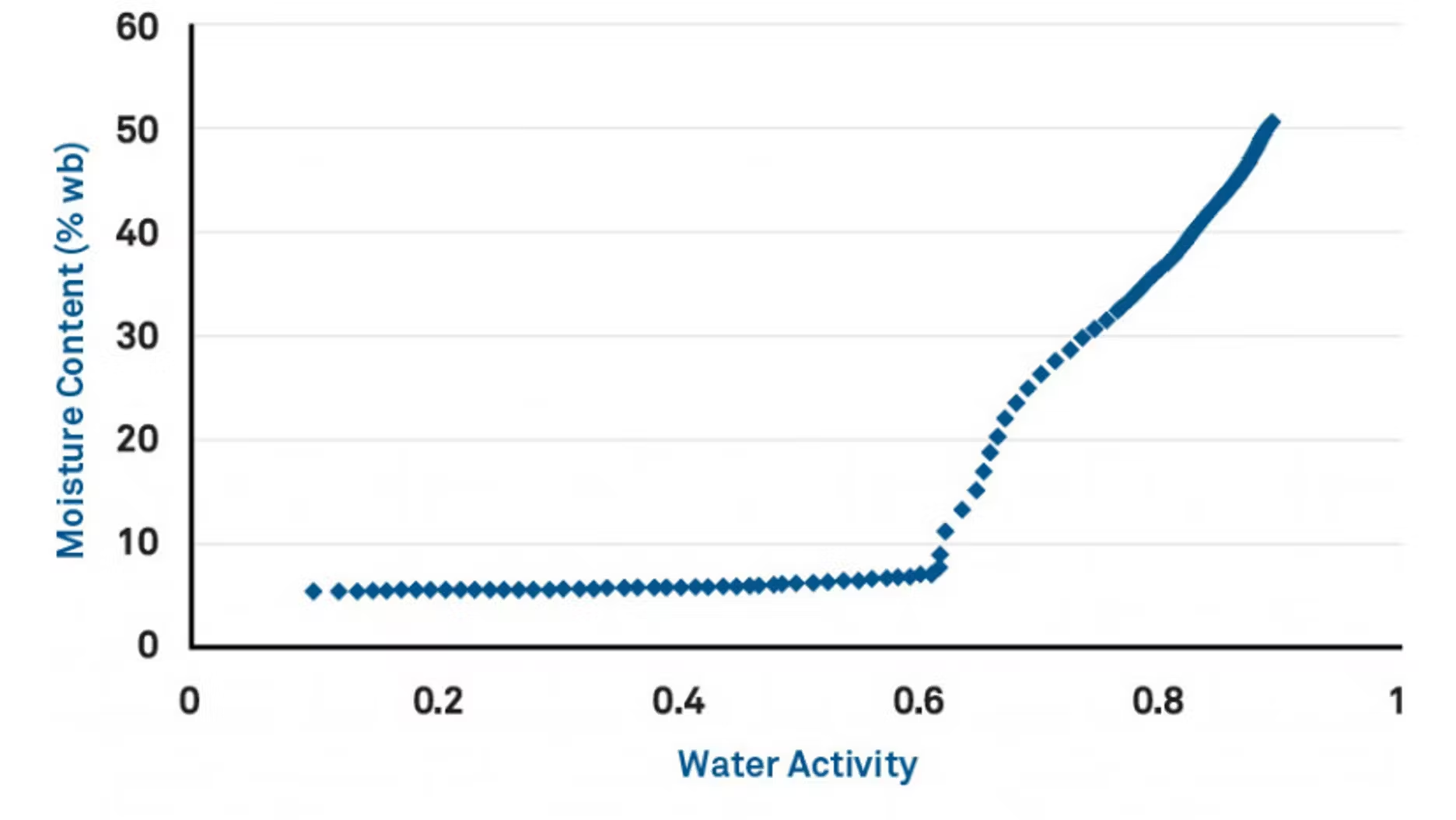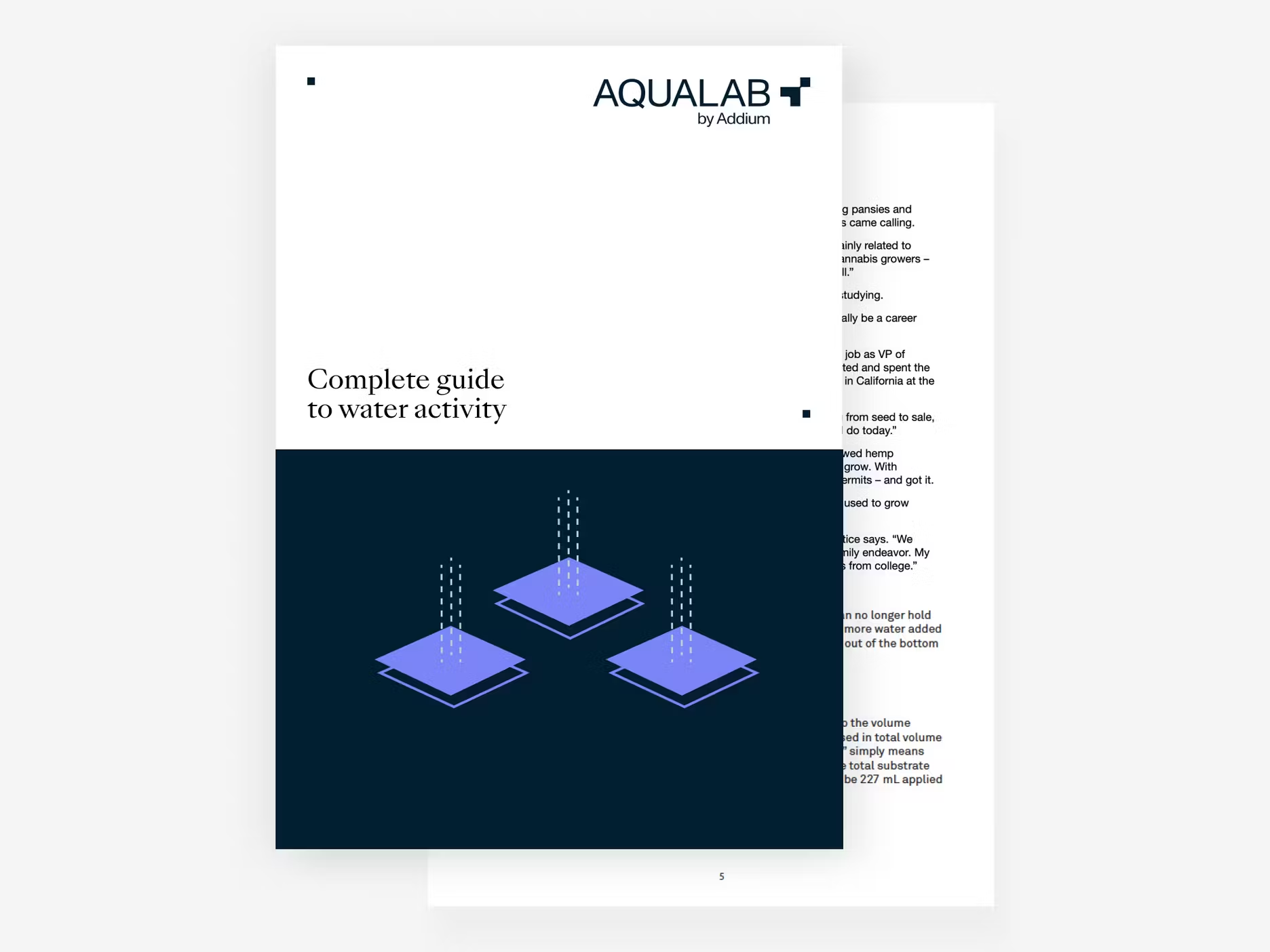Expertise Library
Predict packaging performance to maximize product shelf life

You only need two key metrics to evaluate packaging: water activity and package permeability. Let's take a look at how to use them and why they're important.
Single-serve powdered drink mixes are a growing market segment. To consumers, they’re convenient and affordable. To manufacturers and retailers, they’re profitable, costing significantly less to ship and stock than ready-to-drinks. They are, in fact, the ideal product, but they put the spotlight on packaging. That’s because the two main ingredients in sports drink sticks are drink mix and…packaging.
Each sleeve is a single serving, so packaging accounts for more than 50% of the raw materials cost for this product. The main goal of that packaging is to keep the drink mix free flowing—below the critical water activity—over the target shelf life of the product.
Over-packaging bites profits
Insufficient packaging can allow the water activity in food products to rise or fall over time—causing physical changes, moisture migration, chemical degradation, and susceptibility to microbial growth. Over-packaging, on the other hand, is expensive and can erode profits. How can you figure out the exact amount of packaging your product needs?
Historically, very few manufacturers have made scientific packaging decisions. They’ve used an empirical approach: over-package to avoid problems, and only make changes when problems occur. But in single-serve products, over-packaging can cut into profits significantly. In cases like this, when skillful maneuvering between cost and quality is required, precise scientific information helps.
Correct packaging requires two simple metrics
The most significant determining factor for what will happen to your product’s water activity over time is the permeability of the packaging material—how well it can prevent moisture transfer under different conditions. Thus, to figure out correct packaging for a desired shelf life, you need two simple metrics: critical water activity and package permeability.
Fast and easy critical water activity
The starting point of packaging calculations is a critical water activity value. Traditionally, this point was hard to get—old-school isotherm technologies didn’t deliver exact inflection points. However, the ability to get a precise point from the VAPOR SORPTION ANALYZER (VSA) now makes this type of packaging calculation possible.
The VSA generates a high-resolution Isotherm called a Dynamic Dewpoint Isotherm (DDI) curve. DDI curves save a lot of time in identifying a critical water activity in low moisture food and pharmaceutical products because they clearly illustrate the change in sorption properties of a substance (see Figure 1). This curve shows the glass transition point for a particular drink mix formulation.

Foods higher in moisture may not need a DDI curve because it’s more likely that microbial spoilage is the factor that reduces shelf life. For higher moisture products, the critical water activity limits to identify are for microbial growth and can be found in the literature (0.85 aw is the cutoff for pathogenic bacteria, and no organisms will grow under 0.6 aw). Other factors that reduce shelf life and may need to be taken into consideration when identifying a critical water activity are texture changes, lipid oxidation, Maillard browning, vitamin loss, or color loss.
Why package permeability matters
The driving force for water to move through packaging is a difference in water activity conditions inside and outside the packaging. When there is a difference, there is a driving force for water to either enter or leave the packaging and impact the product.
The goal of packaging is to reduce the rate at which moisture is transferred. This rate is typically reported by packaging manufacturers as a water vapor transmission rate (WVTR). Using the critical water activity and the WVTR of the prospective package, you can do predictive modeling to make cost/benefit decisions.
Predictive modeling is often done through a series of complicated equations (available in Fundamentals of Moisture Sorption Isotherms), but there is a simpler way. A software program called the Moisture Analysis Toolkit will automatically make these calculations for you**.** Simply input variables for a product, and the toolkit will determine the ideal situation for your packaging, even allowing you to vary the analysis parameters and find the packaging that gives you the best return on investment.
Predictive modeling in action
Using packaging calculations, we evaluated four different types of packages for a drink mix—its original package and three possible alternatives. Under humidity abuse conditions (25 °C, 75% humidity), here are the results:
Clearly, the original package was the best performer. But these results prompted two big questions. First, is 7,812 days of shelf life over-packaging? Second, we wondered why a package with 7,812 day shelf life failed after only a couple of months in the bottom of the gym bag. So we ran another test and got a simple answer—the locker room.
Customer abuse can ruin shelf life
The locker room pretty much defines abuse conditions, and tests run to simulate abuse (40 °C, 75% humidity, although many locker rooms we know approach 85 or 90%) showed something startling:
The sports drink stick in the original package would begin caking and clumping in less than a month of locker-room conditions. (If you’re wondering why it still beat the lower-conductance packages 2 and 3, those packages had larger surface areas than the original).
Conductance is temperature dependant, sometimes extremely so, as the “original package” data shows. And ASTM-conforming water vapor transmission rate (WTVR) data doesn’t give you information about conductance at any temperature unless you know the conditions under which the tests were run.
Solve the packaging equation
The drink manufacturer overpaid to over-package and still let consumers down. The only way to really solve the packaging equation is with hard data. VSA high-resolution isotherms let you use streamlined, temperature-dependant water activity equations to:
- Determine the actual vapor conductance of a package
- Compute the time before a packaged product reaches critical water activity under different conditions
- Establish the package conductance you need to meet shelf life requirements
- Find the water activity of a product after a certain period of time under different conditions
For more in-depth information about critical water activity, DDI curves, packaging permeability, and predictive modeling, watch the webinar: Predict Packaging Performance.
Learn more about packaging
In this 30 minute webinar, food scientists Mary Galloway and Zachary Cartwright talk about how to get answers to your shelf life questions. Learn how to:
- Troubleshoot issues and complaints to find out why shelf life is ending sooner than expected
- Predict how recipe changes will impact shelf life
- Compare the effect of different ingredient options
- Evaluate whether a specific packaging option will help you achieve or improve shelf life
Additional information
American Society for Testing and Materials (ASTM). 2008. Standard test methods for water vapor transmission of materials. ASTM E 96-00. Philadelphia, PA.
Azanha, A. B., and J. A. F. Faria. “Use of mathematical models for estimating the shelf‐life of cornflakes in flexible packaging.” Packaging Technology and Science 18, no. 4 (2005): 171-178. Article link.
Carter, Brady P., and Shelly J. Schmidt. “Developments in glass transition determination in foods using moisture sorption isotherms.” Food chemistry 132, no. 4 (2012): 1693-1698. Article link.
Risbo, Jens. “The dynamics of moisture migration in packaged multi-component food systems I: shelf life predictions for a cereal–raisin system.” Journal of Food Engineering 58, no. 3 (2003): 239-246. Article link.
Kilcast, David, and Persis Subramaniam, eds. The stability and shelf-life of food. Cambridge: CRC press, 2000. Article link.
Koutsoumanis, Konstantinos, and George-John E. Nychas. “Application of a systematic experimental procedure to develop a microbial model for rapid fish shelf life predictions.” International Journal of Food Microbiology 60, no. 2 (2000): 171-184. Article link.
Del Nobile, M. A., G. G. Buonocore, S. Limbo, and P. Fava. “Shelf Life Prediction of Cereal‐based Dry Foods Packed in Moisture‐sensitive Films.” Journal of food science 68, no. 4 (2003): 1292-1300. Article link.
Labuza, T. P., and C. R. Hyman. “Moisture migration and control in multi-domain foods.” Trends in Food Science & Technology 9, no. 2 (1998): 47-55. Article link.
Wong, Ee Hua, Yong Chua Teo, and Thiam Beng Lim. “Moisture diffusion and vapour pressure modeling of IC packaging.” In Electronic Components & Technology Conference, 1998. 48th IEEE, pp. 1372-1378. IEEE, 1998. Article link.
Yuan, Xiaoda, Brady P. Carter, and Shelly J. Schmidt. “Determining the critical relative humidity at which the glassy to rubbery transition occurs in polydextrose using an automatic water vapor sorption instrument.” Journal of food science 76, no. 1 (2011). Article link.
Newsletter signup
Case studies, webinars, and articles you'll love.
Receive the latest content on a regular basis!
